READYVILLE, Tenn. -- Tim Sprague had barely come into view when he triggered a deafening orchestra of moos from 23 hungry Angus cows that launched into their slog across muddy, hoof-stamped terrain for dinnertime at the trough.
Predators' love of grass-fed beef helps them bond with local farmers
Players team up to buy pasture-raised meat from season ticket holders
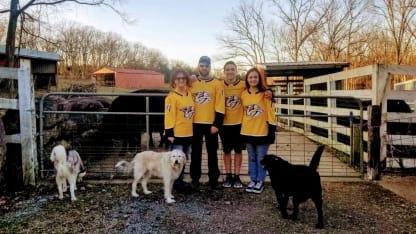
By
Cristina Ledra
NHL.com Staff Writer
Some of these cows will eventually feed a handful of Nashville Predators players who connected over the past two seasons with Sprague and his wife, Angeline Brunetto, season-ticket holders who raise their own animals on their 107-acre property a one-hour drive southeast of Bridgestone Arena.
About half the team is in on the "cowpooling," a practice in which consumers buy ethically and responsibly raised grass-fed beef direct from farmers.
Brunetto and Sprague count Nashville defenseman Mattias Ekholm and his fiancee, Ida Bjornstad, as friends, and along with nine other players, they fund their farming hobby that started as a medical necessity for their family about 10 years ago.
"The quality of the meat is awesome," Predators forward Filip Forsberg said. "It's all organic and good stuff and healthy, and it was great that we could team up. And obviously if that helps the people that are in charge of it, they're really great people, so if we can help them out, that's even better."
Sprague and Brunetto met Ekholm's father, Olle Rosen, at a Predators game a couple of years ago, and after they told him about the animals they raise at home, Rosen introduced them to his son.
"My whole family likes the outdoor wildlife kind of thing, and the way that they live out on the farm and have all these animals over a hundred acres and it's so quiet and peaceful out there, we kind of said we would love to come out and see how they live," said Ekholm, who was born in Borlange, Sweden. "We got out there a couple weeks later and we were fascinated by the American farm kind of life."
When Ekholm and Bjornstad went over for dinner, Brunetto and Sprague served steaks from the cattle they raise and explained how they came to adopt farming about a decade ago.
Their daughter, Kendall, now 16, contracted pneumonia in one of her lungs when she was 5. After unsuccessful attempts at treatment with antibiotics, the infection spread to her other lung. She was on a half-dozen medications and doing breathing treatments, and tests revealed she had a long list of allergies.
When there were no significant signs of improvement, Brunetto and Sprague, each a medical professional, began to evaluate their lifestyle, and realized the amount of processed food and meats containing antibiotics they were consuming was probably hindering Kendall's recovery.
They already had the land to raise the animals. They bought the property shortly after they were married, thinking they would eventually live the farming life. But Kendall's health was suddenly a grave concern, and the family's diet needed an overhaul. They started with eggs from their own chickens and began raising cows on an all-grass diet, and Kendall was off all her medications and back in good health in less than a year.
Sprague and Brunetto have never been commercial farmers, though they each have experience with animals. Brunetto works for a medical insurance company and picks up shifts as an emergency room doctor. She got an associate degree in animal husbandry, the breeding and caring of farm animals, which gave her practical experience. Sprague, who grew up on his dad's farm, handles the bulk of the farming responsibilities and works part-time as a post-anesthesia nurse.
The story of how they became Predators fans is about as typical as you can get in a nontraditional market: She's a transplant and he's a convert.
Brunetto is from Buffalo and used to go to Sabres games. When she moved to Nashville, a friend took her to a Predators game and she was hooked. Sprague, who is from Jacksonville, North Carolina, but spent most of his life in Tennessee, played football growing up and didn't take to hockey at first because it was so different from that sport. But once he got the hang of the rules, he was all-in, to the point where he records Nashville games to watch in the offseason and goes skating with their 15-year-old son, Ethan, every Friday.
Up until the Predators players became interested, Sprague and Brunetto only raised cattle for themselves and friends and family who wanted the meat. Ekholm and Bjornstad got the grand tour around their serene, expansive wooded land, with babbling streams, horses, ducks, chickens, four dogs, rabbits, beehives, the cows, and their garden, and became enamored with the family and their lean, richly flavored, fork-tender beef. Brunetto and Sprague also sent them home with some ground beef.
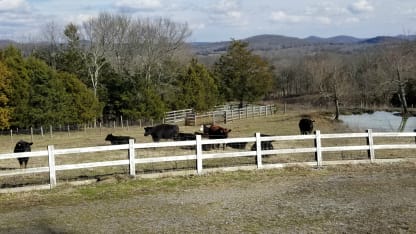
"He wanted to buy half a cow, and I said, 'Well I can't really do half a cow but if you can find someone else to go in with you, we can do that,'" Sprague said.
Ekholm went back to the team and got the Predators' three other Swedish players on board. Ekholm, Forsberg, forward Viktor Arvidsson and center Calle Jarnkrok split the meat from two cows last season. Once word got out among their teammates, defensemen Roman Josi, Ryan Ellis and Yannick Weber, centers Kyle Turris and Nick Bonino and defenseman Anthony Bitetto, now with the Minnesota Wild, bought in and split the meat from three cows this season.
Raising two dozen cows is a full-time job for Sprague in the winter. He makes sure there's hay out for them at all times under a metal and cinder block dome he built, and he feeds them grass pellets every afternoon with a salt magnesium mixture added to guard against grass tetany, a metabolic disease that can cause seizures and death. The calves, which are born in late summer, also drink their mothers' milk. In the warmer months, the cows eat grass from the ground. All year he puts out fresh water for them to drink every day. And there's always something to take care of, like fixing a fence a storm took out, or hopping on his tractor to cut down thorned sapling-like weeds.
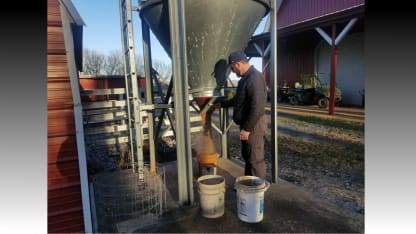
"A lot of it's fun, I love it," Sprague said. "But on those days when it's 20 degrees or 15 degrees, it's hard coming out here and my hands are freezing. But it's not that way every day. In the summers it's a breeze."
Though Brunetto and Sprague have years of experience caring for animals, they're constantly learning new things as they go.
"Some of them will get infections in the eyes or have an injury or a difficult delivery or a calf doesn't survive," Brunetto said. "We've had a couple of moms not take to their babies, so they drop it and walk away and like, 'Oh there's grass,' and it's like, 'Wait, you have a baby and you have to feed it.' So we've bottle-fed many a baby, and a couple we got so attached to, we found homes for them. But there's definitely a learning curve."
The result of all that work is leaner cattle free of antibiotics and growth hormones.
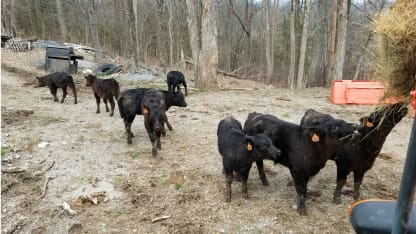
Commercially raised cows in the United States start on a grass diet in a pasture, then shift to a grain diet in a feedlot. The grain, growth hormones and confined space of feedlots allow the cows to grow more quickly than they would on just grass in a pasture. This practice, used to keep up with consumer demand, is the reason commercially raised cows produce beef with higher fat content those raised on pastures. Feedlot overcrowding also has been found to decrease the quality of the meat because of the stress the animals experience before slaughter.
The leaner beef was of particular appeal to the Predators players, and like many other modern consumers, they had the desire to go back to basics and cut through the confusing store-bought meat, with grass-fed, grass-finished, organic, free-range, and animal welfare considerations among the labels. By buying their beef from Sprague and Brunetto, they'd know the animals were raised humanely and naturally.
And even as professional athletes, they're still savvy shoppers. Paying up front for the large quantity of beef, about 150 pounds per person if two players go in on one cow, is both convenient for their busy schedules and much more cost effective than store-bought organic, grass-fed beef. The premium beef works out to about $4 per pound, regardless of the cut. The same would go for around $10 to upwards of $20 per pound in the supermarket.
"You get a lot more for the price," Bonino said. "Obviously they treat the cows very well and the meat is really lean, but it's a bang for your buck and we should be good on meat for a while, especially ground beef."
Sprague said, "People I know at the slaughterhouse are like, 'Man, you're losing out,' and I'm like, 'I'm not in this to get rich.' That's not my point. I did it because of Kendall way back when, and [the cows] help keep my grass down, and I think everybody should be able to eat good meat. As long as it covers all my bills and I make a little extra money to buy grass seed or this, that, and the other, I'm good."
The Predators players are also making positive contributions to the environment by buying pasture-raised cows. When the cows eat the grass down, the roots die out and release organic matter into the soil, encouraging growth of living organisms below the ground and reducing the need for fertilizer. Cows are notorious for their methane gas emissions, which are harmful to the environment, but animals that are free to roam on pastures may help store carbon dioxide in the soil to reduce these effects.
"I think it's cool to be thinking more about the environment and buy local," Ekholm said. "I've probably been more aware about it lately. You look into it and what you see now with all these winter storms coming and with the planet and weather changes, I think it started to get to me too that we need to start thinking about this stuff. If I can help in any small way, I know it's not going to make any huge difference in the big picture, but you have to try to start somewhere."
Still, Ellis wanted to do his due diligence. His wife, Kait, had been encouraged to adopt an all-natural diet to help manage the pain of her rheumatoid arthritis, and Brunetto and Sprague were happy to invite them over. They took a tour of the ranch aboard Sprague's diesel-powered, four-wheel-drive utility vehicle, and Ellis, who grew up in the country in Flamborough, Ontario, shared that he'd one day like to retire to a life on the farm.
"They offered us a chance to see their home and we jumped at that," Ellis said. "We love the outdoors. It was a fun day. [Sprague] took us in the fields and Nashville's a pretty hilly area, so we went up and down the meadow there. It was great."
Ellis is probably many years away from riding off into the sunset, but in the meantime, he and the other cowpooling Predators have had a whole lot of beef. Sprague and Brunetto send the cattle to a nearby slaughterhouse when they're about a year old and weigh 700-800 pounds. There, the meat is cut to each player's request and vacuum sealed. A player could get 150 pounds of ground beef, or some combination of ground beef, steaks and roasts. The players who live in their own homes have also had to purchase stand-alone freezers to hold all that meat, and that of their apartment-dwelling teammates.
The possibilities have sparked the foodies on the team to prepare new dishes with the help of Google. Ekholm received a good portion of his take in ground beef for meatloaf, Bolognese sauce, tacos and Swedish meatballs, but got a roast to try. Sprague and Brunetto chuckled when they realized the Swedish players were unfamiliar with the same roasts that were mainstays on American dinner tables.
"With the ground beef I feel like it's juicy, it's just a really nice taste," Ekholm said. "When you buy a pack of ground beef in the store, it always leaves a little grease."
Forsberg, who said he is not the best cook, purchased a sous vide machine at the start of the season. The foolproof method of cooking food in a bag underwater at a low temperature with the device before browning to finish has produced great results with steaks.
Then there are the more adventurous types, like Bonino and Ellis, who claimed the beef tongues. The 3-4 pound tongue, though not very popular in the United States, is enjoyed in many cultures around the world. Bonino hoped to make ravioli with his. Ellis went for tongue tacos, a popular dish in Mexican cooking.
"I was excited to cook the tongue," Ellis said. "I don't cook much and I thought it would be a fun experiment on an off day. We put it in the slow cooker and braised it for 8 1/2 hours and put a bunch of herbs and stuff in there. The gross part is taking the shell off. You have to strip all that off to get to the meat part of it. But it's one of the more tender cuts of meat I've ever had."
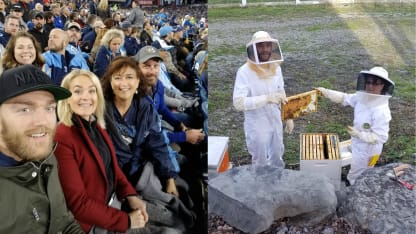
Beyond providing access to high-quality beef, Sprague and Brunetto have given the players a genuine taste of Southern hospitality in their Nashville homes away from home. Ekholm and Bjornstad have each been back to their house many times, and Sprague and Brunetto are planning to attend the couple's wedding in Sweden.
"I don't treat them any different than I would treat my son or my neighbor or whoever, I just treat them like dudes," Sprague said. "And [Mattias] knows when he comes to our house, he can walk in, and I feel the same way at his house. I don't have to ask to go in the refrigerator to get something to drink. The first time he did, I told him, 'You're part of the family now.' I think just think of them all as my friends. It's not a business thing, it's just helping a friend out."

















